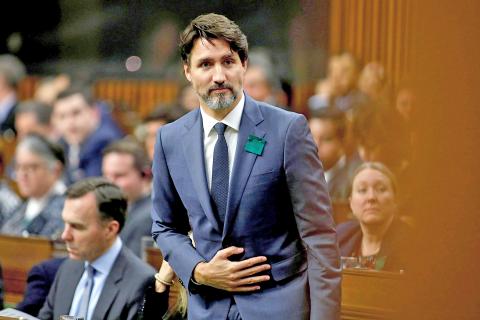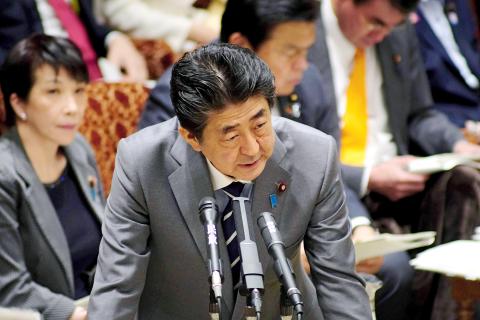President Tsai Ing-wen (蔡英文) yesterday thanked Canadian Prime Minister Justin Trudeau and Japanese Prime Minister Shinzo Abe for their support of Taiwan’s bid to join the WHO as the number of confirmed 2019 novel coronavirus cases in the nation increased to nine.
“Particularly, I want to thank the US, Canada, Japan and other countries for publicly supporting Taiwan’s bid to join the WHO, as well as other international friends who have recently voiced support for Taiwan’s inclusion in the WHO,” Tsai said at the Presidential Office in Taipei as she reassured people about the government’s ability to prevent an epidemic.
“Taiwan is capable of and responsible for making contributions to the world. The WHO must not exclude Taiwan due to political factors,” she said.

Photo: Reuters
Trudeau, after circumventing a question by Canadian Conservative Party leader Andrew Scheer about Taiwan’s inclusion in the WHO in parliament on Tuesday, became assertive when answering the same question from lawmaker Michael Cooper on Wednesday.
“This is a question about Taiwan,” Cooper said, stressing Taiwan by spelling it out. “Does the government support the inclusion of Taiwan in international discussion about the virus? Again, Taiwan, yes or no?”
“Yes, Mr Speaker. As we did during the time of the SARS virus, we support Taiwan’s meaningful participation in international multilateral forums. Especially when its presence provides important contributions to the global public good. We believe that Taiwan’s role as an observer in World Health Assembly meetings is in the best interest of the international health community and it also is an important partner in the fight against this epidemic,” Trudeau said.

Photo: AFP
His remarks were greeted by applause.
It was the first time that a Canadian prime minister had publicly voiced support for Taiwan’s bid to join the WHO, following similar gestures by Canadian Deputy Prime Minister Chrystia Freeland and former Canadian minister of health Ginette Petitpas Taylor, the Ministry of Foreign Affairs said in a statement.
Separately yesterday, Abe told the Japanese parliament that Taiwan’s participation in the WHO is necessary to effectively combat the spread of the novel coronavirus, Kyodo news reported.
“It will be difficult to maintain health and prevent further infections in this region if [Taiwan] is excluded for political reasons,” Abe was cited as saying. “We will continue to make our country’s stance clear at the WHO.”
On Wednesday, Saint Lucian Prime Minister Allen Chastanet issued a statement calling on the WHO to include Taiwan.
“Given Taiwan’s proximity, its importance as a transport hub and its 23 million population, Saint Lucia urgently calls on the WHO ... to ensure that there is full involvement of the Taiwanese authorities in the international consultations, planning and decisionmaking to monitor, control and ultimately halt the further spread of the coronavirus,” the statement said.

INVESTIGATION: The case is the latest instance of a DPP figure being implicated in an espionage network accused of allegedly leaking information to Chinese intelligence Democratic Progressive Party (DPP) member Ho Jen-chieh (何仁傑) was detained and held incommunicado yesterday on suspicion of spying for China during his tenure as assistant to then-minister of foreign affairs Joseph Wu (吳釗燮). The Taipei District Prosecutors’ Office said Ho was implicated during its investigation into alleged spying activities by former Presidential Office consultant Wu Shang-yu (吳尚雨). Prosecutors said there is reason to believe Ho breached the National Security Act (國家安全法) by leaking classified Ministry of Foreign Affairs information to Chinese intelligence. Following interrogation, prosecutors petitioned the Taipei District Court to detain Ho, citing concerns over potential collusion or tampering of evidence. The

Seventy percent of middle and elementary schools now conduct English classes entirely in English, the Ministry of Education said, as it encourages schools nationwide to adopt this practice Minister of Education (MOE) Cheng Ying-yao (鄭英耀) is scheduled to present a report on the government’s bilingual education policy to the Legislative Yuan’s Education and Culture Committee today. The report would outline strategies aimed at expanding access to education, reducing regional disparities and improving talent cultivation. Implementation of bilingual education policies has varied across local governments, occasionally drawing public criticism. For example, some schools have required teachers of non-English subjects to pass English proficiency

‘FORM OF PROTEST’: The German Institute Taipei said it was ‘shocked’ to see Nazi symbolism used in connection with political aims as it condemned the incident Sung Chien-liang (宋建樑), who led efforts to recall Democratic Progressive Party (DPP) Legislator Lee Kun-cheng (李坤城), was released on bail of NT$80,000 yesterday amid an outcry over a Nazi armband he wore to questioning the night before. Sung arrived at the New Taipei City District Prosecutors’ Office for questioning in a recall petition forgery case on Tuesday night wearing a red armband bearing a swastika, carrying a copy of Adolf Hitler’s Mein Kampf and giving a Nazi salute. Sung left the building at 1:15am without the armband and apparently covering the book with a coat. This is a serious international scandal and Chinese

NEGOTIATIONS: The US response to the countermeasures and plans Taiwan presented has been positive, including boosting procurement and investment, the president said Taiwan is included in the first group for trade negotiations with the US, President William Lai (賴清德) said yesterday, as he seeks to shield Taiwanese exporters from a 32 percent tariff. In Washington, US Trade Representative Jamieson Greer said in an interview on Fox News on Thursday that he would speak to his Taiwanese and Israeli counterparts yesterday about tariffs after holding a long discussion with the Vietnamese earlier. US President Donald Trump on Wednesday postponed punishing levies on multiple trade partners, including Taiwan, for three months after trillions of US dollars were wiped off global markets. He has maintained a 10 percent